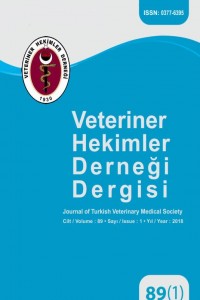2000-2015 yılları arasında evcil hayvanlarda damar dokusu tümörlerinin geriye-dönük olarak değerlendirilmesi
Abstract
Bu çalışma
ile 2000-2015 yılları arasında Ankara Üniversitesi Veteriner Fakültesi Patoloji
Anabilim Dalı’na gönderilen ve damar dokusu tümörü tanısı konulan biyopsi ve
operasyon materyallerinin geriye-dönük olarak değerlendirilmesi amaçlandı. Çalışmanın
materyalini Ankara Üniversitesi Veteriner Fakültesi Patoloji Anabilim Dalı’na
2000-2015 yılları arasında Fakülte klinikleri ve özel veteriner kliniklerinden
ulaştırılan, rutin doku takibi ile incelenen ve damar dokusu tümörü teşhisi
konulan 75 adet biyopsi ve operasyon örnekleri oluşturdu. İncelenen 3172 adet
biyopsi ve operasyon materyallerinden 75 tanesinde damar dokusu tümörlerine
rastlandı. Damar dokusu tümörlerinden 58 tanesinin kötü huylu, 17 tanesinin ise
iyi huylu olduğu görüldü. Köpeklerde hemangioperisitomlar en sık dişilerde,
hemangiomlar ve hemangiosarkomlar ise erkeklerde saptandı. Köpeklerde incelenen
61 adet materyalden %55.7’sinin (34/61) hemangioperisitom, %23’ünün (14/61)
hemangiosarkom, %13.1’inin (8/61) kavernöz hemangiom ve %8.2’sinin (5/61)
kapillar hemangiom; kedilerde ise incelenen 10 adet materyalden %70’nin (7/10)
hemangiosarkom, %20 ’sinin (2/10) kapillar hemangiom ve %10’nun (1/10)
hemangioperisitom olarak tanımlanmıştır. Ayrıca üç adet muhabbet kuşunda birer
adet kapillar hemangiom, hemangioperisitom ve hemangiosarkom görüldü. Bir atta
ise kapillar hemangiom olgusuna rastlandı. 2000-2015 yılları arasında Anabilim
Dalı’na getirilen biyopsi ve operasyon materyallerinin %2.36’sını (75/3172)
damar dokusu tümörlerinin oluşturduğu saptandı. Köpeklerde daha çok
hemangioperisitomlar gözlenirken kedilerde hemangiosarkomların daha sık oluştuğu
sonucuna varıldı. Çalışmada bu tümörlerin orta yaş ve üzeri köpek ve kedilerde
görülmesi diğer verilerle uyumluydu. Lokalizasyona göre incelendiğinde damar
dokusu tümörlerinin deri ve/ veya derialtında daha çok ekstremite ve abdomen bölgelerinde
yerleşim gösterdiği fark edildi. Kedi ve köpek dışındaki hayvanlarda yeterli
sayıda olgu olmadığından, bu türlerdeki damar dokusu tümörleri için detaylı bir
değerlendirme yapılamamıştır.
References
- .
Abstract
The aim of this
retrospective study is to determine the variety and classification of biopsy
and operation materials sent to Ankara University, Faculty of Veterinary
Medicine, Department of Pathology between the years of 2000 and 2015, which
were diagnosed as vascular tissue tumors. The materials of this study are 75
biopsy and operation samples received from the clinics of the Faculty and from
some private veterinary clinics between the years of 2000 and 2015, which were
diagnosed as vascular tissue tumors as a result of the routine process.
Seventy-five cases of vascular tissue tumors were reported over 3172 samples.
It was stated that 58 of vascular tissue tumors were malign, the remaining 17
were benign. In dogs, hemangiopericytoma were mostly observed in females,
whereas, hemangioma and hemangiosarcoma were observed in males. Over the 61
materials examined in dogs, 55.7% (34/61) appear as hemangiopericytoma, 23%
(14/61) as hemangiosarcoma, 13.1% (8/61) as cavernous hemangioma and 8.2%
(5/61) as a capillary hemangioma. Over the 10 materials examined in cats, 70%
(7/10) was determined as hemangiosarcoma, 20% (2/10) as capillary hemangioma
and 10% (1/10) as hemangiopericytoma. In addition capillary hemangioma,
hemangiopericytoma and hemangiosarcoma were determined in three budgerigars. A
case of capillary hemangioma was reported in a horse. It was noticed that 2.36%
(75/3172) of biopsy and operation materials received by our Department were
diagnosed as vascular tissue tumors between the years of 2000-2015. It was
concluded that hemangiopericytoma occurred mostly in dogs and hemangiosarcoma
in cats. In our study, the high occurrence of the tumor in middle aged and
older dogs and cats was compatible with the other studies. As examined
according to localisation vascular tissue tumors are seen on the skin and/or in
subcutaneous tissue, more in extremity and abdomen. Because there are not
enough cases in species other than cat and dog, a detailed evaluation of
vascular tissue tumors has not been made in these species.
References
- .
Details
| Primary Language | Turkish |
|---|---|
| Journal Section | Research Article |
| Authors | |
| Publication Date | January 15, 2018 |
| Submission Date | October 31, 2017 |
| Acceptance Date | November 13, 2017 |
| Published in Issue | Year 2018 Volume: 89 Issue: 1 |
Veteriner Hekimler Derneği Dergisi (Journal of Turkish Veterinary Medical Society) is an open access publication, and the journal’s publication model is based on Budapest Access Initiative (BOAI) declaration. All published content is licensed under a Creative Commons CC BY-NC 4.0 license, available online and free of charge. Authors retain the copyright of their published work in Veteriner Hekimler Derneği Dergisi (Journal of Turkish Veterinary Medical Society).
Veteriner Hekimler Derneği / Turkish Veterinary Medical Society


